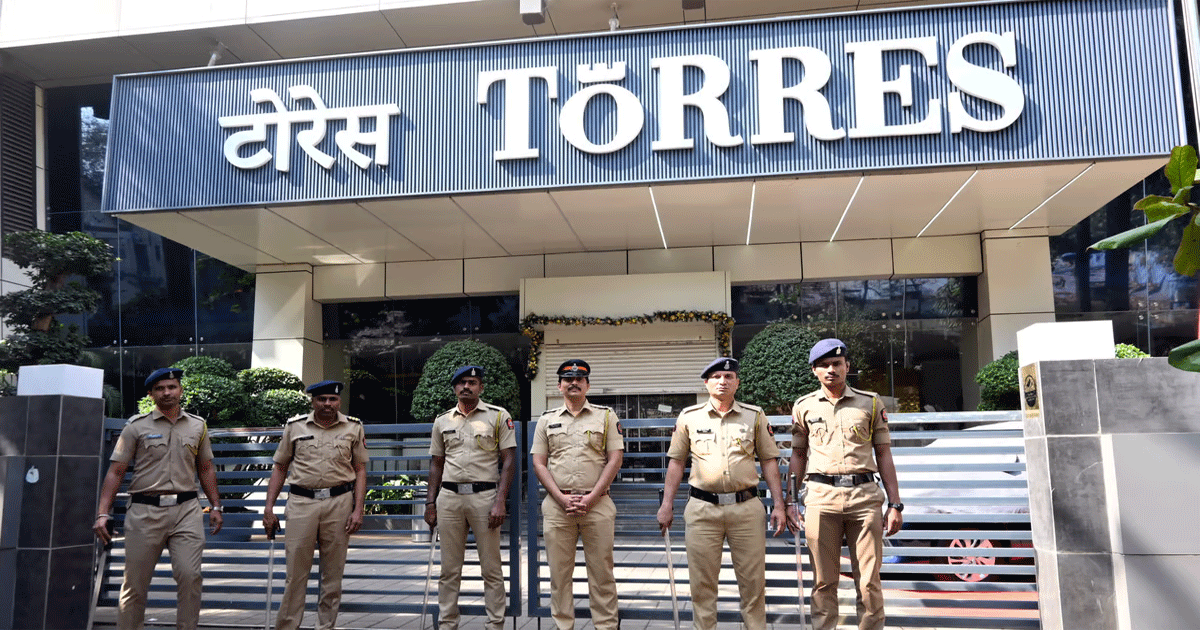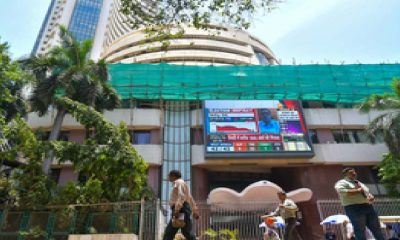Business
Torres Company Scam: ₹1000 Crore Fraud, 1.25 Lakh Investors Duped, Three Arrested, Kingpins Flee To Ukraine, Case Transferred To EOW

Mumbai: A massive investment scam by the foreign-based Torres Jewelry company has left over 1.25 lakh investors defrauded of ₹1,000 crore. The company, which promised high returns on jewelry and diamond investments, has collapsed, with its directors shifting the blame to Indian executives. The Economic Offenses Wing (EOW) has taken over the investigation, and an FIR under the Maharashtra Protection of Depositors Act and various BNS sections has been registered.
Three individuals—Sarvesh Ashok Surve, Tanya Casatova, and Valentina Kumar—have been arrested, while the alleged masterminds, Ukrainian nationals John Carter and Victoria Kowalenko, fled the country. Lookout Circulars (LOCs) have been issued for their arrest. Torres Company launched operations in Mumbai in February 2024, opening a flagship showroom in Dadar and branches in Navi Mumbai, Kalyan, Borivali, and Mira Road. The company offered an alluring investment plan.
Investors purchased jewelry or moissanite diamonds and received official receipts. A digital account and unique customer ID were created for each investor. A weekly return of 6% was promised, amounting to triple the investment value over 52 weeks.
Sarvesh Surve, a local resident with no prior business credentials, was appointed as the director to provide a local face to the foreign venture. Surve’s digital signatures were used for all official documents, while John Carter and Victoria Kowalenko controlled operations from the shadows. Tanya Casatova, an Uzbek national, managed stores, and Valentina Kumar, a Russian citizen married to an Indian, oversaw retail operations.
Police sources revealed that Surve was unaware of the larger conspiracy, making him a convenient scapegoat. Before fulfilling the promised 52-week term, Torres stopped payments in December 2024, citing technical issues. On January 1, 2025, the company abruptly shut down its showrooms.
When irate investors gathered outside the Dadar office on January 6, Tanya and Valentina were confronted and detained by Shivaji Park police. Surve was also arrested. Preliminary investigations estimate that over 1.25 lakh investors were defrauded, based on the highest customer ID numbers issued. The total fraud amount could exceed ₹1,000 crore. Police stations in Shivaji Park, APMC (Navi Mumbai), and Mira Road witnessed long queues of investors filing complaints, with many FIRs registered in just two days.
Authorities are now coordinating with international agencies to apprehend Carter and Kowalenko. Meanwhile, the EOW has urged investors to file complaints to strengthen the case.
Business
BSE launches 4 new BSE 100 large-cap TMC universe factor indices

New Delhi, Dec 10: The Bombay Stock Exchange’s (BSE) subsidiary BSE Index Service on Wednesday announced the launch of four new factor Indices from the universe of BSE large-cap total market capitalisation (TMC) index with 5 per cent stock level capping.
The newly introduced indices are BSE large-cap 100 momentum 30, BSE large-cap 100 low volatility 30, BSE large-cap 100 enhanced value 30, and BSE large-cap 100 quality 30.
“BSE Index Services Pvt. Ltd., a wholly owned subsidiary of BSE, today announced the launch of 4 new BSE factor indices from the BSE 100 large cap TMC index as the universe with 5 per cent stock level capping,” the exchange said in a press release.
These Indices are Reconstituted Quarterly, have a base value of 1000, and the first value date is June 20, 2005, along with the additional screening for the liquidity profile, the release added.
BSE large-cap 100 Momentum 30 will track the performance of the 30 companies in the BSE 100 large-cap TMC that exhibit the most persistence in their relative performance, based on their momentum scores. Constituents are weighted based on their momentum score.
BSE large-cap 100 Low Volatility 30 will measure the performance of the 30 least volatile companies in the BSE 100 large-cap TMC. Constituents are weighted by their inverse volatility.
BSE large-cap 100 Enhanced Value 30 measures the performance of the 30 companies in the BSE 100 large-cap TMC with the most attractive valuations, based on their value scores. Constituents are weighted based on their value score.
BSE large-cap 100 Quality 30 measures the performance of the 30 companies in the BSE 100 large-cap TMC that exhibit the most persistence in their relative performance, based on their momentum scores. Constituents are weighted based on their momentum score.
“Building on the success of factor launches on the BSE 500 universe earlier in the year, we are pleased to expand our factor family with the launch of four new factor indices, this time on the large-cap universe,” BSE Index Services Pvt. Ltd MD & CEO Ashutosh Singh said.
“These indices, in the same vein as our BSE 500 universe factor family, will be reset on a quarterly basis with the introduction of an innovative score-based only weighting method,” he added.
The index said that these new indices can be used for running passive strategies such as ETFs and Index Funds.
It can also be used for benchmarking of PMS strategies, MF schemes and fund portfolios. Additionally, investors can now access a broader spectrum of market opportunities, further enriching their investment strategies with this latest addition to BSE’s suite of indices.
Business
Installed renewable energy capacity in India reaches 250.64 GW: Govt

New Delhi, Dec 10: The total installed renewable energy (RE) capacity in India reached 250.64 GW (as on October 31), with solar energy constituting a major chunk, the Parliament was informed on Wednesday.
The solar energy capacity increased from 2.82 GW in March 2014 to 129.92 GW, wind energy capacity increased from 21.04 GW in March 2014 to 53.60 GW, and biomass power capacity has increased from 8.18 GW in March 2014 to 11.61 GW within the given period, Minister of State for New and Renewable Energy, Shripad Yesso Naik, said in a written reply in Lok Sabha.
India is a key driver of this explosive global surge in renewable energy. In the last 11 years, the country’s solar capacity has grown from 2.8 GW to nearly 130 GW, a rise of more than 4,500 per cent. Between 2022 and 2024 alone, India contributed 46 GW to global solar additions, becoming the third-largest contributor.
The country recorded its highest-ever addition of non-fossil capacity in the current financial year at 31.25 GW, including 24.28 GW of solar.
According to reports, the share of India’s electricity generation from renewable energy (RE) capacity, including large hydro, is expected to cross 35 per cent by FY30 from 22.1 per cent in FY25, with expected incremental capacity addition of around 200 GW between FY25 and FY30.
This, in turn, also hinges on the extent of implementation of the ongoing project pipeline, where the projects are bid out and the PPAs are signed, the development of adequate transmission connectivity infrastructure as well as timely bidding for new RE projects, along with the power purchase agreements (PPAs) signing by Central nodal agencies, states the report by rating agency ICRA.
With global mechanisms now shaping industrial competitiveness, India’s shift towards renewable energy has become even more urgent and strategically important.
Business
Mumbai: RTO Files Criminal Cases Against Uber, Ola, Rapido After Fatal Highway Crash In Mulund

Mumbai: Following the death of a woman passenger in a collision involving a speeding mixer truck and an illegally operated Uber-linked Activa scooter on the Eastern Express Highway, the Regional Transport Office (RTO) has taken serious note of the incident and initiated criminal action directly against the directors of Uber, Ola and Rapido.
Five FIRs have been registered across four police stations, Navghar, Nehru Nagar, Pant Nagar and Amboli. An official of the state transport department said, “We will ensure strict action against all those operating bike taxis in violation of RTO norms, including suspension of licences. No violations will be tolerated.”
According to the FIR filed on December 1 by the Navghar police, the accident occurred at 11am on November 29 beneath the Airoli Flyover on the Eastern Express Highway, Mulund (East). The accused driver, Jawahir Yadav, 40, was allegedly driving a mixer truck at high speed and in a rash and negligent manner when he rammed into an Activa scooter that had been registered on the Uber platform without any transport permit.
The impact left the scooter rider, Ganesh Madhav, seriously injured, while the pillion rider, Shubhangi Magre, 49, died. The Navghar police initially booked the truck driver for causing death by negligence. Subsequently, based on a complaint filed by Motor Vehicle Inspector Ravindra Gawde of the Mumbai East RTO (Wadala), the Navghar police registered a case against the directors of Uber India Systems Pvt Ltd.
Investigations revealed that rider Madhav had registered an Activa scooter belonging to his maternal uncle with Uber without mandatory permission from the transport department. He then reportedly ferried passengers using another scooter (MH 03 EM 4233), also without authorisation. The police have invoked relevant sections of the Bharatiya Nyaya Sanhita, the Motor Vehicles Act, and the Maharashtra Bike Taxi Rules, 2025, against Uber India directors.
The FIR states that Uber violated the conditions of its temporary permit for app-based transport services by allowing unauthorised private scooters to be registered on its platform. Following the Navghar case, RTO officials began booking bike taxi rides through various apps to initiate further action. On December 3, the Nehru Nagar police registered a case against the directors of Roppen Transportation Pvt Ltd (Rapido), stating that the company was illegally operating petrol-engine bike taxis in Mumbai without any licence from the Maharashtra government or Regional Transport Authority.
The Nehru Nagar police filed a second FIR against directors of both Rapido and Uber on December 4. On the same day, the Pant Nagar police also registered a case against Rapido’s directors for similar violations. On December 5, after booking four rides through the Rapido app and one through the Ola app, RTO officials filed another case at the Amboli police station, alleging that both companies were facilitating illegal passenger transport for profit. The police officials said investigations in all cases are underway.
-

 Crime3 years ago
Crime3 years agoClass 10 student jumps to death in Jaipur
-

 Maharashtra1 year ago
Maharashtra1 year agoMumbai Local Train Update: Central Railway’s New Timetable Comes Into Effect; Check Full List Of Revised Timings & Stations
-

 Maharashtra1 year ago
Maharashtra1 year agoMumbai To Go Toll-Free Tonight! Maharashtra Govt Announces Complete Toll Waiver For Light Motor Vehicles At All 5 Entry Points Of City
-

 Maharashtra1 year ago
Maharashtra1 year agoFalse photo of Imtiaz Jaleel’s rally, exposing the fooling conspiracy
-

 National News1 year ago
National News1 year agoMinistry of Railways rolls out Special Drive 4.0 with focus on digitisation, cleanliness, inclusiveness and grievance redressal
-

 Maharashtra1 year ago
Maharashtra1 year agoMaharashtra Elections 2024: Mumbai Metro & BEST Services Extended Till Midnight On Voting Day
-

 National News1 year ago
National News1 year agoJ&K: 4 Jawans Killed, 28 Injured After Bus Carrying BSF Personnel For Poll Duty Falls Into Gorge In Budgam; Terrifying Visuals Surface
-

 Crime1 year ago
Crime1 year agoBaba Siddique Murder: Mumbai Police Unable To Get Lawrence Bishnoi Custody Due To Home Ministry Order, Says Report






















